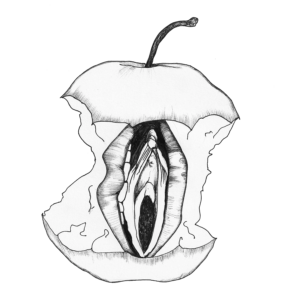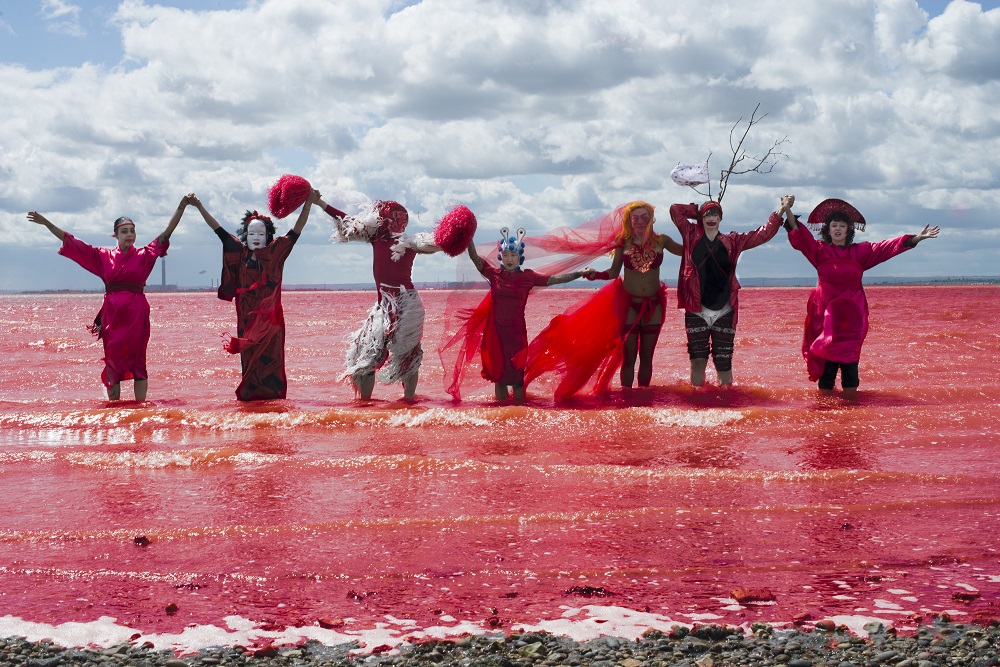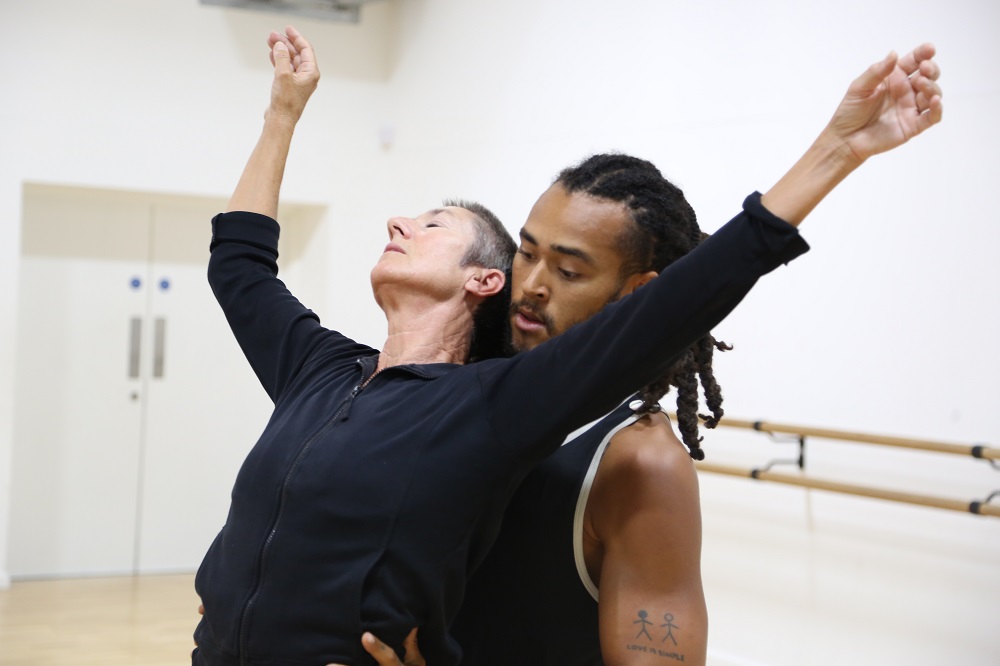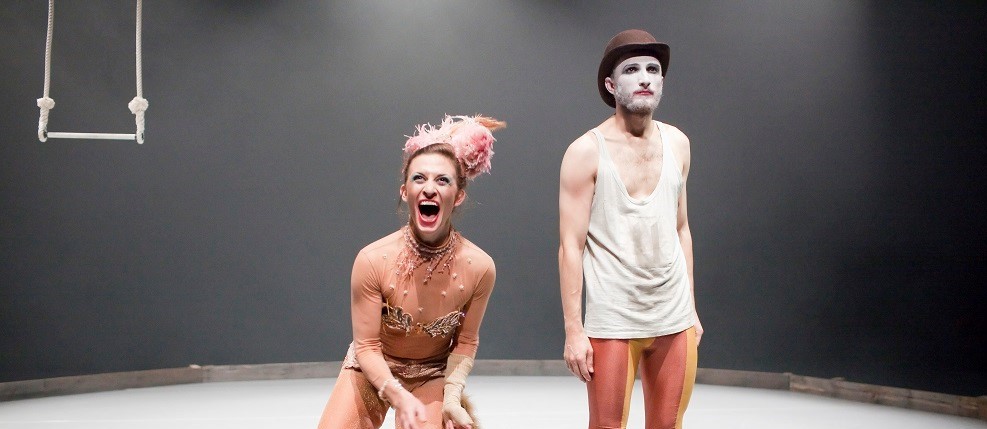As artists, we often have to consider how to sell our work, when we are describing it. Can you tell us about your work in a way that resists the temptation to repeat your show copy. How do you relate to your work? What’s not in your blurb?
I think what I never write in a bio or copy, is that I use personal experience as a metaphor for wider global issues and a way of making bigger themes easier to grab hold of – humanising the intangible is kind of what I want to say. I think also what I want to do with my work is promote love and humanity, but that’s also something that you can’t write in your copy, because people will think you’re a fucking weirdo!
I sometimes worry that my blurb is going to come across a bit highbrow, or too intellectual, because it’s difficult to give people a feel of the depths of stuff without doing that, but that’s actually the opposite of what I do and what I want to express. Grittiness is really important. I like that human nature is base and dirty and I think that my work reflects that, but it’s sometimes hard to write about the themes and let it sound as gritty as it is. It makes me want to put on my promo – this isn’t wank! – but the show I’m working on at the moment is about sex work, so there is actually quite a lot of wank.
What performance communities do you work with or feel part of and why?
I feel like an outsider. I don’t think I belong in circus or physical theatre. I find it difficult pitching my work, especially in a more mainstream context as I don’t really feel like there is a name for what I do. People talk about imposter syndrome when they’re performing, but I feel like an impostor just walking into a theatre to watch a show. I don’t know how to lose that, but I think that being an outsider makes you see things about the world that other people don’t see. It’s actually something to celebrate, and I’m working on enjoying the fact that I snuck in through the back door and got away with it! I started doing something weird and people found it interesting and are taking me seriously, when I don’t even know how I got here.
I think we need more imposters. I think it’s something the performance world needs to work on, making the people who are doing things differently feel welcome. There’s not actually enough space for difference.
Can you give us an insight into your curating and devising process?
I start off with an idea and I draw a lot and I write a lot, and it’s all just very messy, then I go into a space and spend a lot of time just playing with those ideas. If I can get people in to watch stuff, that’s great, but even just in front of a mirror exploring, ‘What does this do? What can I do with this?’
I like it to be fluid, but I think it’s important not to settle. Sometimes you come up with something and you think, ‘Oh, that’s great!’ You go home really happy with yourself, write it all down… but my thing is to not set things, not be happy with that, to go back to it the next day and see how you can push it, develop it further and make it a bit less obvious. I like extremes. It’s not that it was wrong originally, but quite often it’s maybe just a bit boring and you can do better. There’s always another joke or another point. Especially if you are making experimental stuff, or working with ideas that aren’t normally talked about or performed, I think it’s important to keep trying to push that into something more interesting.
That’s the way I devise – never be happy!
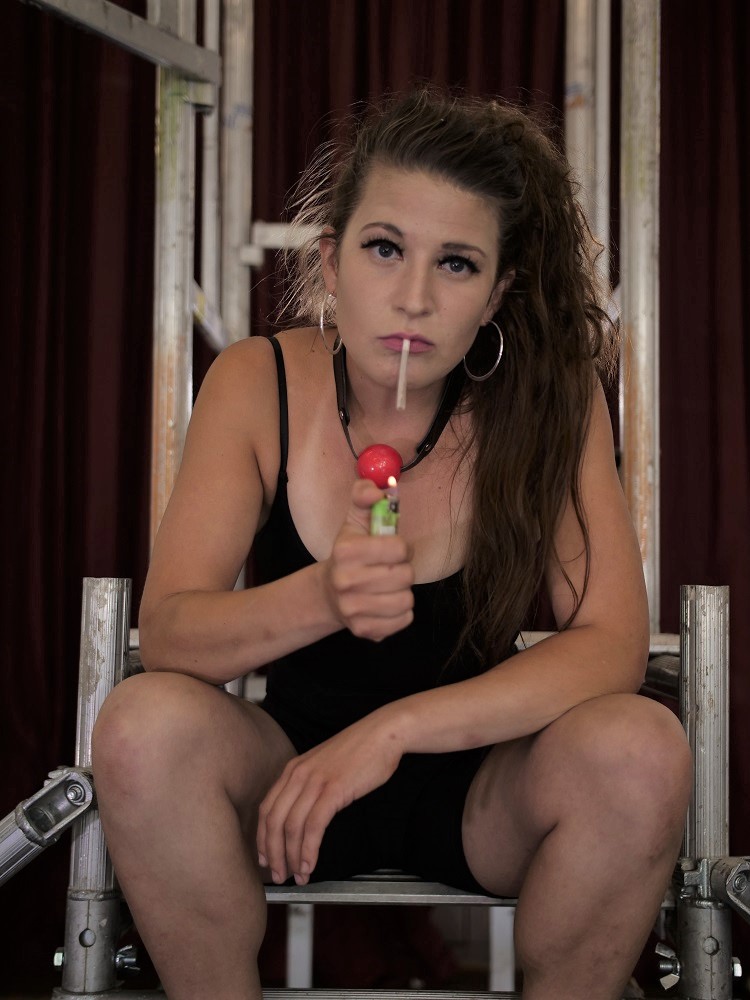
How do you approach working with autobiographical material?
Autobiographical stuff is obviously very personal. I feel that you have a duty to tell the truth, and be real in it, but you also have a duty to yourself, particularly if you are working with difficult stuff or things that were traumatic. So I will always abstract that in some way and take it away from the pain, maybe make a joke about it. Laughing is really important to me, so I might make it so extreme that it becomes funny for example. That helps to make it less intense, the moment or event, works more like a starting point or stimulus. But there has to be truth in it. That’s the really beautiful thing about using autobiographical stories – accessing that humanity. I think the honesty of speaking from your experience opens the audience up, makes them more open to what you’re saying and to finding some understanding in there.
Can you tell us a bit about your experience working with circus, and share some of your journey and learning?
When I started practising circus I wanted to be a normal circus performer, I trained at Circomedia on the degree, I wanted to do pretty things in the air… but that totally changed when I saw Box of Frogs, by Stumble Dance Circus [Mish Weaver]. Before that, I hadn’t thought about circus as a way of using spaces which aren’t normally occupied or using physical material as a metaphor to give life to the unspeakable or unexplainable. The concept was that the circus was bipolar and there was a collection of these incredible performers, physicalising and vocalising the experience that people who interpret the world with those extremes have… like, it is a spectacle – someone going through that stuff – it’s incredible sometimes, you know, just having so much energy, and so much power and being able to do everything and then, not. The juxtaposition between those experiences and actually seeing it, physicalised, I was just like, ‘Wow! This can actually do something really important!’ I think every psychiatrist in the world should see that show. I don’t like the term, mental health, but it was just such a beautiful reflection of that experience and survival actually, it was so human. It changed my life actually, and the way that I felt about performing and what it could do.
What form does circus take in your current work?
I still think of my work as circus, I still feel connected to that kind of dirty glamour circus has, but I’ve moved away from traditional equipment for the time being, away from tricks and what people would think of when they think of circus. Circus for me has a looser definition, the use of physical abilities that other people don’t have, climbing around and using space that isn’t normally used… There’s something in the juxtaposition of skill and struggle, I like seeing the physical effort, seeing that stuff hurts when it hurts. I also love the showmanship, the acknowledgement of the audience and giving them space to respond or take things in – I think the fourth wall thing is so weird, ‘You can see us! We’re all here, we all know we’re here!’
What inspires you and influences the work that you do?
I feel like this is a really difficult question because everything influences me, but in terms of style, I think I’m massively influenced by stand-up comedy. I love the fact that they just stand there and say their thing, it’s unapologetic and I love that. I’m also a bit of a Greek mythology geek. Even the gods, these most powerful beings are so human. They’re bitchy, they have tantrums, they can do anything in the world, but they don’t. They take a dislike to someone and then make it their mission to go make their life hell, or whatever. I think I’m massively influenced by that, the juxtaposition of human problems against a global kind of equilibrium or sense of the greater good.
I’m interested in sociology, looking at the way that people are placed in the world, whether it’s class, or whether it’s just through success, or someone’s ability to get through a situation. And I’m also interested in how we place or judge people – who we think is important, who we want to be like, or who we don’t, who we kind of just write off. I think it’s fascinating.
How do your personal politics influence your work?
I am prone to overthink everything, so that often means I mix up my personal experience with what’s going on in the world. Everyone does it to some extent, like feeling blame for more stuff than you could possibly influence. In my shows I really push that connection, to the point where you have someone with a totally dual experience. My current project Cockroach is about sex work and climate change and the central character is both the earth and a very flawed sex worker who is struggling with all kinds of different things. It was great to fuse those worlds together and think, okay, how are these two things alike? If the earth was a woman what would she think? Would she be at the end of her tether? What would a suicidal planet think? It was kind of fun to put really human thoughts – like overthinking, over analysing everything, onto something incredible and powerful, to make it flawed and human. It becomes a metaphor for a struggling planet that’s being used for enjoyment, without any thought of the repercussions of that extreme use. I guess I hope that seeing that parallel opens people to see the ways they do have influence. I think the less we can get caught up in our own heads, the more we can actually do some good in the world.
How do you want your audiences to feel?
I want them to enjoy it but maybe they will feel a bit uncomfortable at the same time. I think my comedy is a bit dark and abstract for some people, but the world is dark and abstract, and it reflects that. Being abstract is also a way of not being preachy. I think not overly telling people what they should think and making people laugh allows the meaning to be more resonant. I want them to go home and reflect in their own way about how and why these things are important.
What bores you as an audience member?
I’m bored by anything that’s too neat and too tidy, or too measured, or when I don’t feel like the moment is unique. I like a bit of chaos and I like to see people lose their shit. I think it’s a release for the audience and for the performer to be free from perfect choreography, there’s a reason that live performance is good, it’s exciting, it’s in the moment and it could go wrong, anything could happen. I want to be excited, otherwise why are we here? Y’know, just film it!
How was your experience at the Edinburgh Fringe?
I performed the work in progress of Cockroach [Shower Scene Zoo Playground 2019] at Edinburgh Fringe last year. Having a different live audience every day and having that feedback for a month was a great thing. I lived in my car while I was there to save on costs though and that was a big old stress on top of doing a show every day for a month. I wish the fringe was more accessible and affordable, so it could be used as a testing ground, in the way that it was originally meant.
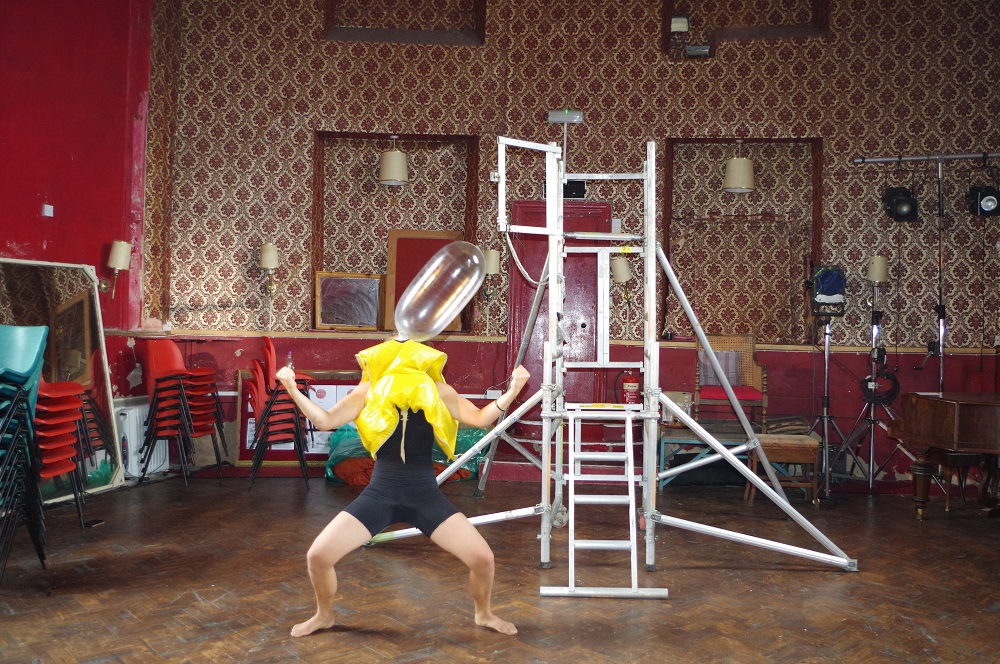
At my last performance, I had a group of women who were sex workers in the audience. They came and found me after the show and we had this massive chat… they said it was the first show they’d seen where they felt like the work was for them, that they’d seen loads of stuff about what they do, but they never felt included in the discussion. It meant a lot to me as one of the things I don’t like about performance is that in general it caters for a very specific, kind of liberal, middle-class audience, and if people from different backgrounds do come to see work they don’t feel like they’re spoken to, they’re spoken about. So yeah, I had a little cry. These women were just so incredible, and honest and thankful to me for making the work. It was actually the most standout moment I’ve had as a performer, I actually felt that I could make a difference.
Can you tell us about someone influential in your journey as an artist?
Mish Weaver has influenced me loads, also Bim Mason, who has helped me a lot with having confidence in what I do. Niki McCretton of Stuff and Nonsense Theatre, who I work with on family shows. She has helped me to see the things that I think of as my flaws, as my strengths, and taught me that being a bit of an idiot, being a bit jumbled, is actually okay.
Then there are the performers who have inspired me, like Bryony Kimmings, Doug Stanhope and Stuart Lee… and an incredible clown called Marni Godbold.
